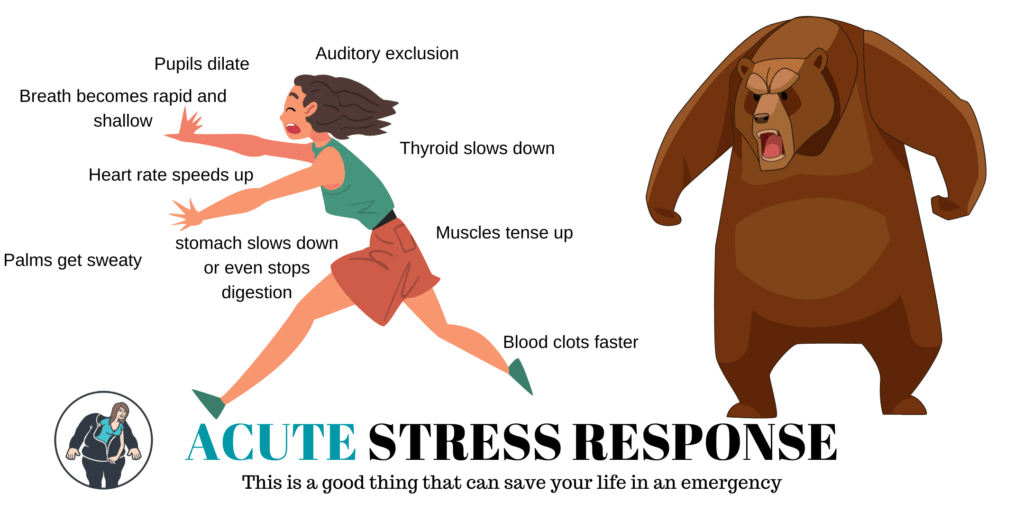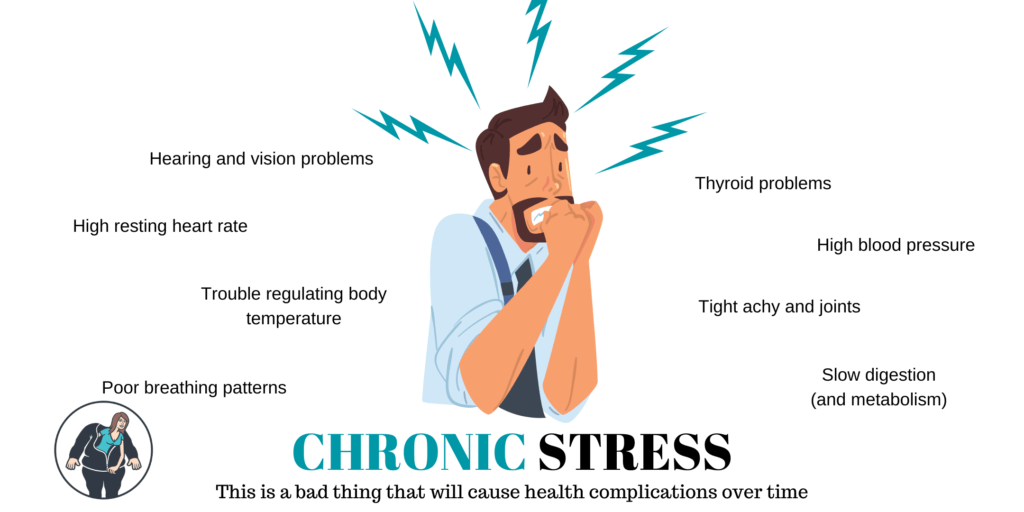Can you gain fat from stress?
A little over 6 in 10 adults in America reported undesired weight change during the year 2020. It’s no secret that stress was a significant factor in that. To break those statistics down. The average adult gained 29 pounds that year, with men gaining an average of 37 pounds and women earning an average of 22 pounds. Millennials (Ages 25-42) were hit the hardest, with an average weight gain of 41 pounds. Here’s the thing, you don’t just gain fat because you are overeating; you also gain fat just from being stressed out. Keep reading to see how that happens.
The relationship between stress and body fat
The results of 2020 gives us a window into the relationship between stress and weight gain. We know that stress makes us gain weight, but how?
First, we need a refresher on why people gain body fat. This can be summarized with these two key points.
- You gain body fat when your energy intake (calories from food/drink) exceeds your TDEE (Total Daily Energy Expenditure)
- You can gain weight if your hormones are off, which affects your TDEE. However, this can still be overcome with lifestyle changes and medications.
Nothing matters as much as energy balance regarding gaining and losing body fat. It doesn’t matter if you “eat healthy” if you overeat healthy food. Weirdly enough, undereating is one of the biggest causes of fat gain because it slows down your metabolism and leads to overeating over time.
Please click on the link to read our full article on How We Gain Body Fat! I highly suggest you read this at some point. It gives you critical insight into how your body works.
Two different systems
As we learned in our article “Understanding Metabolism,” your TDEE comprises your BMR (Basal Metabolic Rate). These calories you burn at rest, primarily taken from your organs to keep your body functioning. Remember that part; it will be important later!
Now let’s talk about what stress is. To know what stress is, we need to understand two different and critical nervous systems. One is the parasympathetic nervous system, and the other is the sympathetic nervous system.
The parasympathetic nervous system is synonymous with “Rest and Digest.” In this state, your body recovers, digests, repairs, and hums along doing its happy routine.
Whereas the sympathetic nervous system is synonymous with “Fight or Flight.” This happens when your body goes into action and prepares to save you from danger, as seen in Figure 1

Acute Stress
Imagine that you are out in nature, and a terrifying thing happens. Maybe a bear jumps out in front of you? Your body would spring into action by activating the sympathetic nervous system. Immediately, through a shot of adrenaline, your body will do several things:
- Pupils dilate so that you can take in more of your surroundings. They help you with decision-making and reaction time.
- Ears develop auditory exclusion, which helps you zero in on what can save your life, and tunes out ambient noise.
- Your breath becomes rapid and shallow to quickly power the muscles so you can run away or fight.
- The heart rate speeds up to help quickly deliver blood to the muscles.
- The stomach slows down or even stops digestion. As a result, blood flow to the stomach is cut off, and blood is redirected to the muscles for survival.
- The muscles up and down your spine tense up. This would create body armor in case you are hit or cut during an emergency. Protecting the nervous system from damage. (This also means the muscles in your pelvic floor tighten up and tuck around the base of the spinal cord to protect it) The muscles in the jaw also tighten to protect the mandible from being torn off.
- The palms get sweaty. Sweat helps cool the body and keep you functioning during an emergency.
- Your blood has several chemical reactions including the adrenal glands dumping adrenaline into the body, chemicals that cause the blood to clot faster in case of injury, and the slowing down of the Thyroid (This happens to help cool the body)
All of these reactions are designed to help you survive in an acute emergency situation. See Figure 2. With every bit of energy being redirected towards immediate survival. The acute stress response is a very good thing!

Acute Stress vs. Chronic Stress
Let’s take a step back and look at all that for a minute. Everything that happens in an emergency stress response to keep us alive. We call this acute stress. Acute stress is a good thing, and that spike of adrenaline you feel when you get spooked is designed to keep you alive during an emergency. I promise this is relevant to gaining and losing fat; it might actually be one of the most relevant things. Keep reading!
Acute stress is good, but what is chronic stress? Chronic stress is when we have small levels of stress that build up in our everyday lives. Things like traffic, bills, work, politics, and so on. We don’t have a big spike of adrenaline as we do with survival situations in acute stress, but we do end up spending more of our day in a slightly more sympathetic state vs parasympathetic.
See all those physiological responses listed above in the acute stress section? When you are under chronic long-term stress, all those things happen on a smaller scale over time. See Figure 3.
Read that list again! When you are stressed do you get headaches from light? Do you develop selective hearing? How deep and slow is your breath while at work? Does your heart rate spike when you are watching Stranger Things? You get the point. Chronic stress directly translates to smaller symptoms of acute stress over long periods of time. Which is not a good thing.
Acute stress is a good thing, chronic stress is a terrible thing. What chronic stress essentially does, is that it adds to the TWO BIG factors in weight gain!
- Chronic stress slows down your digestive system and other organs. Therefore slowing down your BMR. For someone who eats the same calories all the time and gets the same amount of exercise. Adding stress to their lives might slow down their metabolism enough that they gain fat without changing anything else.
- Chronic stress creates a number of chemical reactions that have a negative effect on your hormones like Thyroid and DHEA and so many more. When your hormones go out of whack. Then so do your energy and motivation. It becomes a negative downward spiral of feeling worse and worse. Unless you stop the cycle and make some major changes.

The Stress Performance Curve
I hear it all the time at the clinic. Patients come in and tell me that they had a stressful life change, then their weight just started to pile on. Many times we assume these changes to our metabolism are a function of aging. When in reality we are the ones who are slowing down our metabolism with our stressful lifestyle!
Look, I know we can’t control some things like divorce, death, or unrest with current events, but we can take steps to manage the stress caused by the things out of our control. As well as take steps to remove the stress by things we can control.
If you think that your metabolism has been slowed down by stress, I suggest you read my tips below to help naturally increase your metabolism. {This will be next week’s article I will write to link} As well as coming into the clinic and starting the detox diet.
Ultimately, we need to assess our lifestyle. Looking at the things we can control, vs the things we can’t control. Stressful commute? Change your route to work and listen to something you enjoy so your commute is more pleasant. Stressful career? Consider a career change or negotiate for a different role/ workload within your career. I highly recommend the book Boundaries at Work by Dr. Henry Cloud and Dr. John Townsend.
There is something called the “Stress Performance Curve”. This is a simple graph in Figure 4 that shows the window of helpful stress, vs negative stress. Just like many things in life, we want to get the right amount. Not too much, or too little!
Having no stress in your life leads to feeling bored and listless. Having too much stress leads to panic, burnout, anxiety, and eventually total breakdown. The key is to pay attention to your overall performance, and what stressors you are dealing with at the time. If you know you have a stressful season coming up, do what you can now to minimize your other stressors.

To sum it up
- Stress causes your metabolism to slow down and makes you gain fat.
- The parasympathetic system is rest and digest; we need to spend more time here.
- Sympathetic is fight or flight, we need to pay attention to how often this gets triggered.
- Acute sympathetic stress is a helpful biological survival technique.
- Chronic sympathetic stress will slow down your metabolism and wreak havoc on your health.
- Utilize the stress performance curve to ensure you get the right amount of stress in your life.
Do you feel like stress is taking a toll on your life? Call our clinic today and schedule your first appointment with our provider. We can help start to reverse the symptoms of stress while you work to get your life back. With our help, we can start to reverse the negative spiral of stress in your life.


